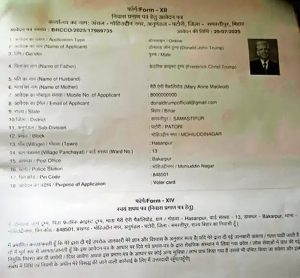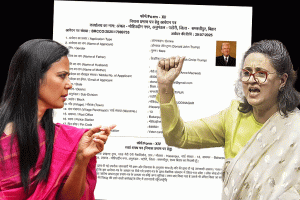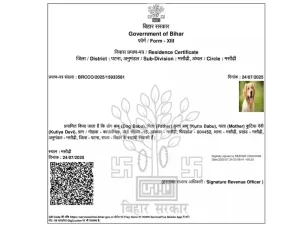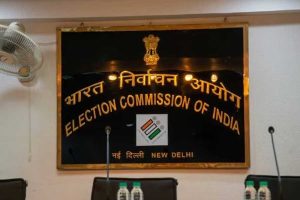Bihar – The electoral roll revision drive has encountered another shocking Bihar fake residence application, this time submitted in the name of US President Donald Trump. This latest incident adds to a growing list of prank entries that have disrupted the Special Intensive Revision process, raising serious questions about the integrity and security of the electoral registration system.
The drive, designed to update and clean the electoral rolls, has been marred by multiple Bihar fake residence application entries including submissions for “Dog Babu,” “Dogesh Babu,” and “Sonalika Tractor.” These fraudulent submissions have prompted authorities to lodge FIRs and implement stricter verification measures.
Trump Application Details Reveal Sophisticated Fraud Attempt

The Donald Trump Bihar fake residence application was submitted on July 29 from Samastipur district, claiming residency in Hasanpur village, Mohiuddin Nagar block. The application demonstrated remarkable attention to detail, including a passport-style photograph and accurate listing of Trump’s actual parents’ names—Frederick Christ Trump and Mary Anne MacLeod.
This level of detail in the Bihar fake residence application suggests a coordinated effort to test or potentially exploit vulnerabilities in the electoral registration system. The sophistication of the fake entry raises concerns about the potential for similar attempts that might be more difficult to detect.
District administration officials recognized the fraudulent nature of the Bihar fake residence application and rejected it on August 4, characterizing the submission as a “diabolical attempt” to disrupt the ongoing electoral roll revision process.
Administrative Response and Investigation Measures
The Samastipur district administration has taken swift action regarding the Bihar fake residence application, registering a case at the Cyber Police Station for comprehensive investigation. Officials emphasized the seriousness of the offense and committed to pursuing appropriate legal action against those responsible.
“It appears there is a diabolical attempt to negatively impact the special intensive revision of electoral rolls which is underway as per the instructions of the Election Commission,” stated the district administration. This response highlights the potential impact such fraudulent applications could have on the electoral process.
The administration clarified that no certificate was issued for the Trump Bihar fake residence application, despite some misleading reports suggesting otherwise. The verification process successfully identified and rejected the fraudulent submission during routine scrutiny procedures.
Opposition Leaders Launch Scathing Criticism


Congress leader Randeep Singh Surjewala seized upon the Trump Bihar fake residence application incident to launch broader criticism of the electoral roll revision process. He characterized the fraudulent applications as evidence that the entire electoral drive represents a fraudulent attempt to manipulate voter registration.
“This is the biggest proof that electoral roll revision in Bihar is a fraud, aimed at stealing votes. The Congress and Rahul Gandhi are fighting to thwart this design,” Surjewala declared, calling for increased vigilance and public involvement in monitoring the process.
The Bihar fake residence application controversy has provided opposition leaders with ammunition to question the Election Commission’s oversight and the integrity of the electoral registration system throughout the state.
Trinamool Congress Alleges Mass Disenfranchisement


Trinamool Congress MP Mahua Moitra expanded criticism beyond individual Bihar fake residence application incidents, alleging systematic voter suppression. She claimed that 65 lakh voters had been deleted from electoral rolls without proper consultation or discussion.
Moitra characterized the drive as “nothing but an exercise in mass disenfranchisement,” suggesting that the Bihar fake residence application entries represent just the visible tip of a larger problem with the electoral revision process.
The MP referenced additional fake entries discovered in Khagaria district, including an application for Lord Ram listing Raja Dashrath and Maa Kaushalya as parents, further illustrating the scope of fraudulent submissions plaguing the electoral system.
Also Read: Explosive Tejashwi Yadav Voter Card Controversy Shakes Up Bihar Political Scenario
Pattern of Fraudulent Applications Raises Security Concerns


The electoral process has been compromised by numerous Bihar fake residence application submissions that demonstrate varying levels of sophistication. From obviously fake entries like “Dog Babu” to the detailed Trump application, these submissions reveal potential vulnerabilities in the online application system.
The recurring nature of Bihar fake residence application incidents suggests either systematic attempts to disrupt the process or inadequate security measures in the application verification system. These incidents have prompted calls for enhanced verification protocols and improved cybersecurity measures.
Election Commission Under Pressure to Address Systemic Issues


The Bihar fake residence application incidents have placed the Election Commission under intense scrutiny from opposition parties and civil society organizations. Critics argue that the frequency and sophistication of fake applications indicate fundamental flaws in the electoral registration system.
The Election Commission faces mounting pressure to address these Bihar fake residence application security concerns while maintaining the integrity and timeline of the electoral roll revision process. The commission must balance the need for comprehensive verification with efficient processing of legitimate applications.
Future Implications for Electoral Integrity
The Trump Bihar fake residence application incident and related fraudulent submissions have broader implications for electoral integrity and cybersecurity in democratic processes. These events highlight the vulnerability of online registration systems to manipulation and the need for robust verification mechanisms in electoral administration.

